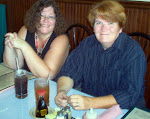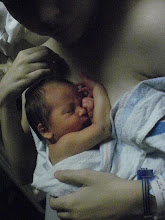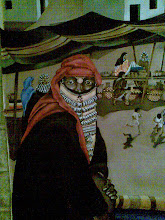 I just had to share this...incredibly affirming!
I just had to share this...incredibly affirming!TRANSGENDER OFFICER LIVING
HIS DREAM, AS A COP AND A MAN
Bountiful police: 'We're glad he works here,' says chief.
By Rosemary Winters, The Salt Lake Tribune
As a child, Kerry Bell dreamed of growing up to become a policeman -- both a police officer and a man. Becoming a cop was relatively simple -- Bell joined the Bountiful Police Department 14 years ago. Becoming a man took more time.
Born female, Bell came out as transgender about a year and a half ago and started a transition to a new life as a man. He always had felt male, but did not think switching genders was a viable option until he saw transgender people gaining wider acceptance, along with advances in medical technology.
Surprisingly, the 42-year-old -- working in what many perceive as a super-macho culture -- says he did not fret about telling the police chief or his co-workers to start referring to him as "he," not "she." "I wasn't worried about coming out at work," says Bell, who has had hormone treatments and surgeries.
"I've worked for Bountiful for 14 years. I know everybody I work with." Although some employees have trouble remembering to use masculine pronouns, Bountiful Police Chief Tom Ross says, "everyone's done a great job of accepting Kerry and staying focused on why we're here in the first place." Bell, a corporal and SWAT member, is a "well-rounded police officer," Ross adds. "We're glad that he works here."
Some things about Bell's transition were easy. He did not have to wear different clothes to work. Uniforms, he jokes, are exactly that --uniform. His first and last name also stayed the same, although he dropped a middle name, Ann, and changed the gender marker on his driver license.
His "only anxiety," he says, was telling his parents, who divorced when Bell was 2 years old. But his mother, his father and their spouses were supportive.
"You have to accept your children for who they are," says his dad, Terry Bell, who lives in Rockville near Zion National Park. "It's a little difficult for me, after 40 years, to think of my daughter as a son. That's hard. [But] it hasn't changed a thing about how I feel about him as a person."
Now, Kerry Bell works to increase understanding between his two worlds: law enforcement and the lesbian, gay, bisexual and transgender (LGBT) community. The relationship between the two communities has had ups and downs. A police raid on a New York gay bar erupted into the 1969 Stonewall riots, launching the modern gay-rights movement, and it was transgender people who led the way.
Far less hostility exists today -- homosexuality has been decriminalized -- but many LGBT people remain wary of contacting the cops, Bell says. Some worry about whether they will be treated with respect. Others, who are in the closet, fear being outed. Bell belongs to the LGBT Public Safety Committee, an informal group with police representatives from Weber County to West Valley City that has been working for nine years to bridge the gap.
The committee members help gay and transgender people understand police procedures. They coach police on how to respond to cases of same-sex domestic violence and gay cruising in parks. In fact, they helped launch a successful Salt Lake City program that steers those caught having sex in public places toward counseling, not jail. If the violators do not repeat the offense for a year -- the vast majority don't -- the charges are dropped.
That many LGBT officers now serve openly at several Utah law-enforcement agencies speaks volumes to how far society has progressed, says Salt Lake City Capt. Kyle Jones, a founding member of the committee. "Twenty years ago, they wouldn't have been [welcome]," says Jones, who was inspired to get involved with the LGBT community after his son came out as gay. "The current crop of officers, by and large, don't give it a second thought."
Jones, along with other committee members, recruits potential new officers at the annual Utah Pride Festival for the Salt Lake City Police Department. "Our department has tried for years to recruit from the populations that we represent," Jones says. "Anywhere from 8 to 12 percent of [Salt Lake City] is thought to be LGBT so we should have 8 to 12 percent of our cops who are LGBT."
Bell hopes being out can help "demystify" what it means to be transgender. As a Davis County kid, Bell says he always felt like a boy. It was something he didn't know how to express to his family. At age 6, he gathered up all his dolls and gave them to a neighbor. He hated going to church on Sunday because it meant he had to wear a dress. "I thought God had just put me in the wrong body, and one day I'd wake up and I'd be the way I was supposed to be," says Bell, a Salt Lake City resident. "Of course, you reach an age where you realize that's not going to happen."
At 16, Bell told his parents he was attracted to women after they asked if he was gay. As a lesbian, Bell found a home in the LGBT community. He also learned more about people who are transgender. He looked into surgery at age 18 but decided the techniques were too "barbaric."
More than 20 years later, he decided he was ready for the change. "I'm a generally optimistic and happy person," he says. But "I've probably felt better in the last year and a half than I have at any point in my life."
His other joyful moments are similar to those for most police officers: helping someone in need, maybe even hearing a "thank you."
[Contact: rwinters@sltrib. com.]
[The Tribune, joining only a few other major newspapers (so far), accompanied its article with an educational sidebar which may help to demystify common terms in the TLGB community. These glossaries are not always as comprehensive -- or accurate -- as might be wished by the people they claim to describe or explain, but they are probably better than nothing, and they seem to be getting better, perhaps because they are more often written these days by people in the community themselves.]
TRANSGENDER TERMS
Gender identity: One's internal, personal sense of being a man or a woman or in between. It is different from sexual orientation, which pertains to whether a person is attracted to men, women or both sexes.
Transgender: An umbrella term for people whose gender identity or expression differs from their birth sex. The term may include people who identify as transsexual or gender queer or who cross-dress.
Transsexual: A person whose gender identity is other than his or her biological sex. Transsexuals may alter their bodies through hormones or sex reassignment surgery to align their anatomy with their self-perception.
Cross-dressing: To occasionally wear clothes traditionally associated with people of the other sex. Cross-dressers usually are comfortable with their birth sex and do not wish to change it. "Cross-dresser" should not be used to describe someone who has transitioned to live full time as the other sex or who intends to do so in the future.
Gender queer: A person who rejects the traditional two-gender system. It is an evolving concept, but generally refers to those who do not consider themselves solely masculine or feminine.
Transition: A complex, long-term process of altering one's birth sex. It can include coming out, changing one's name and sex on legal documents, hormone therapy and, possibly, surgical alteration of the chest and/or genitals. Not all transgender individuals wish to transition to the other sex.
Source: The Utah Pride Center and the Gay & Lesbian Alliance Against Defamation
Copyright 2009 The Salt Lake Tribune















































A great story of people behaving like mature, caring adults for a change. And from Utah, of all places. So if people can act sensibly in Utah, there's hope for everyplace else!
ReplyDeleteThis is an amazing story. It warms my heart to hear tales of acceptance and outreach.
ReplyDelete